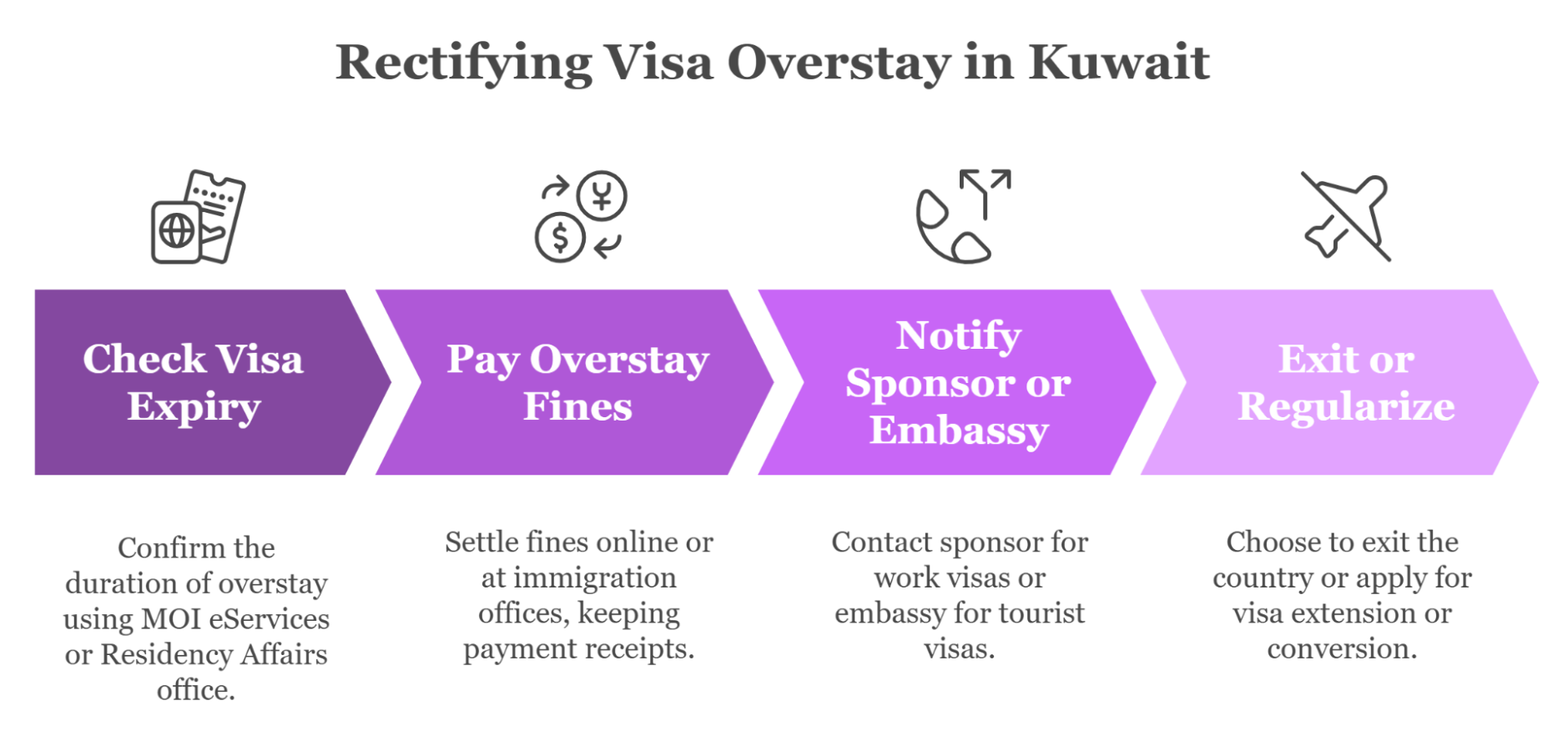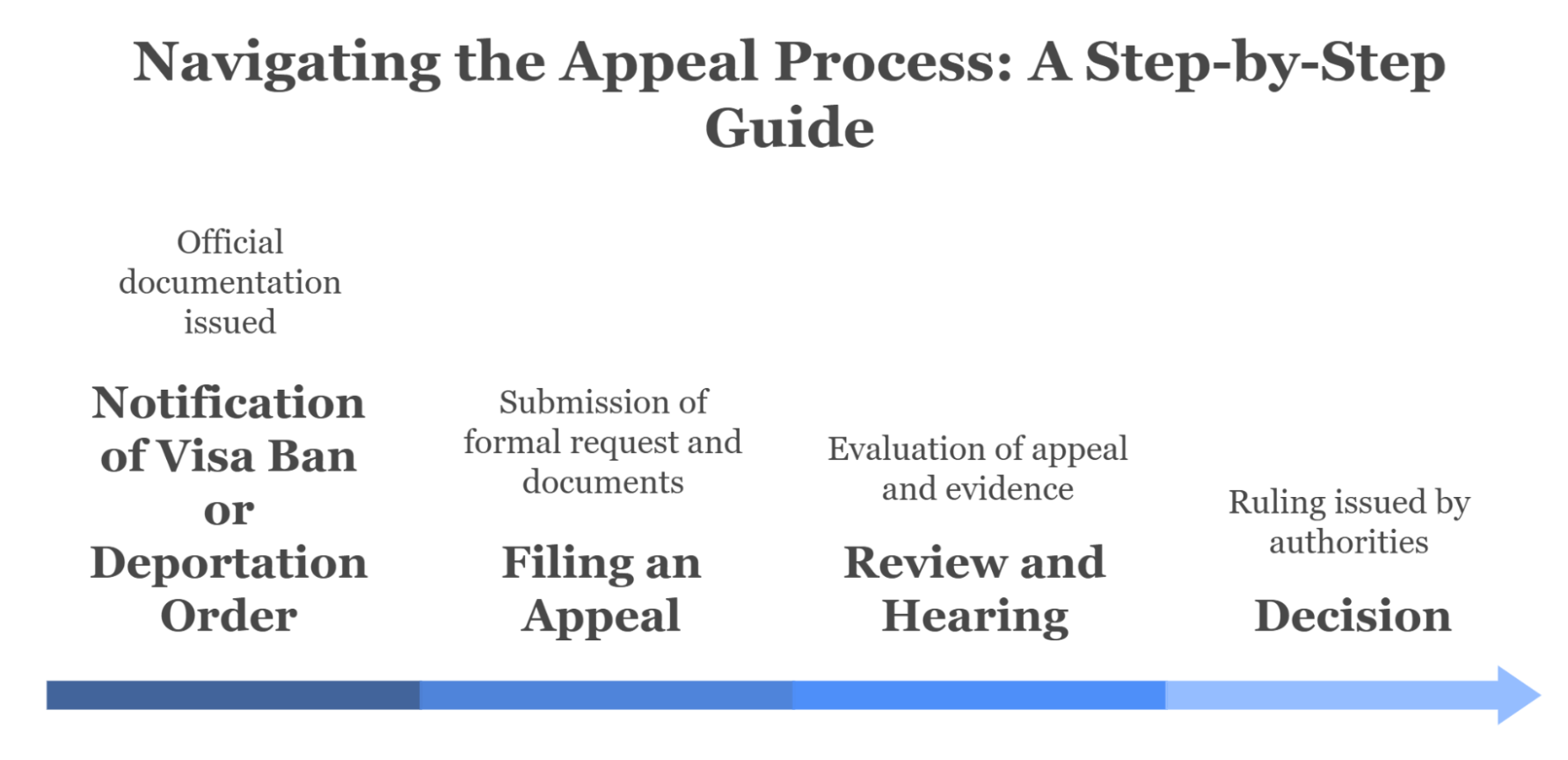Overstaying a visa in Kuwait is a serious immigration violation governed by the Aliens Residence Law (Law No. 17 of 1959).
Whether you are in Kuwait on a tourist, business, work, or dependent visa, exceeding the allowed stay can lead to daily fines, deportation, blacklisting, and future visa ineligibility.
Overview of Kuwait Visa Categories and Validity
Understanding the visa category and its specific duration is the first step in maintaining lawful immigration status. Kuwait issues several types of visas, each with defined validity and permitted length of stay:
|
Visa Type |
Validity |
Permitted Stay |
|
Tourist/Visit eVisa |
30 days from issue |
Permitted stay is up to 30 days from date of entry |
|
Business Visa |
Varies, generally 30 days |
Up to 30 days |
|
Work Visa (Iqama) |
Valid as per contract |
Renewable annually |
|
Family/Dependent Visa |
Linked to sponsor’s visa |
Varies; generally long-term |
|
Transit Visa |
Up to 7 days |
One-time short stay |
Consequences of Overstaying a Visa in Kuwait
Overstaying a visa in Kuwait can trigger a chain of serious legal and financial outcomes. The longer the overstay, the more severe the penalties become.
- Daily Fines for Overstay: Kuwait imposes a daily fine for every day a person remains in the country beyond the permitted stay. These fines continue to accumulate until the individual either exits the country or regularizes their status. Ensure all fines are paid in full before attempting to leave the country or apply for a visa extension.
- Deportation and Entry Bans: Failing to resolve an overstay can result in deportation, which may come with a ban on re-entry to Kuwait or other Gulf countries. This outcome can severely impact future travel and employment opportunities in the region. Deportation can occur without the need for court proceedings in some cases, especially for those who do not voluntarily exit.
- Detention and Legal Action: In some cases, overstaying a visa may lead to detention and further legal action. Individuals who are found violating labor or immigration laws may face court cases or imprisonment in addition to fines. Overstayers involved in any criminal activities (such as illegal employment) may face additional charges.
- Impact on Future Visas: An overstay record negatively affects future visa applications. Applicants who previously overstayed may be denied entry into Kuwait or other GCC countries in the future.
How to Rectify an Overstay in Kuwait
Taking timely action is essential if you have overstayed your visa in Kuwait. Here's how you can address the issue before it escalates further.
Step 1: Check Visa Expiry
Begin by confirming the duration of your overstay. This can be done via the MOI eServices portal, your passport stamp, or by visiting a Residency Affairs office.
Step 2: Pay Overstay Fines
Once you know how long you’ve overstayed, the next step is to settle any fines. These can typically be paid online or at designated immigration offices.
Important: Keep your payment receipts as evidence of compliance.
Step 3: Notify Your Sponsor or Embassy
Depending on your visa type, contact either your local sponsor (for work visas) or your embassy (for tourist or dependent visas) to seek guidance and support.
Step 4: Exit or Regularize
You can choose to either voluntarily exit the country or attempt to regularize your visa status. This may include applying for an extension or converting your visa type, depending on your eligibility.

Common Mistakes Leading to Overstay
Visa overstays in Kuwait often occur due to preventable errors. Being aware of these common mistakes can help travelers and residents stay compliant with immigration laws and avoid costly consequences.
- Ignoring visa expiration reminders: Failing to set calendar alerts or ignoring text/email notifications can result in accidental overstays.
- Assuming there's a grace period: Unlike some countries, Kuwait does not generally offer a grace period after visa expiry.
- Relying on verbal assurances from others: Always consult official immigration channels instead of relying on advice from friends or unverified sources.
- Failure to check visa type restrictions: Each visa has different conditions, and assuming all visas are equal is a common mistake.
- Assuming renewal is automatic: Renewals require active application and are not granted unless approved by authorities.
Special Amnesty Programs in Kuwait: Definition and Overview
A Special Amnesty Program is a temporary regulatory measure implemented by the Kuwaiti government aimed at addressing issues related to irregular residency and visa overstays.
These programs provide an opportunity for individuals who have violated immigration laws, such as overstaying their permitted visa duration or residing without valid authorization, to regularize their status or exit the country without incurring penalties.
Purpose and Objectives
The primary objectives of Special Amnesty Programs include:
- Mitigating the prevalence of unauthorized residents within Kuwait.
- Facilitating voluntary compliance with immigration regulations.
- Providing a humanitarian resolution to individuals in irregular status.
- Reducing the burden on enforcement and detention resources by encouraging orderly departures.
- Enhancing border security and immigration control.
Appealing a Visa Ban or Deportation in Kuwait
Visa bans and deportations are serious consequences faced by individuals who violate Kuwait’s immigration laws, such as overstaying a visa, working without authorization, or breaching residency regulations.
However, affected persons may have the option to appeal these decisions through established legal and administrative channels. Understanding the appeal process is crucial to safeguard one’s rights and potentially reverse or mitigate the penalties imposed.
Grounds for Appeal
An appeal may be considered valid if:
- There was a procedural error during the deportation or ban decision.
- The individual can demonstrate mitigating circumstances (e.g., medical emergencies, misunderstandings).
- Evidence exists showing compliance with immigration rules or an intent to rectify violations.
- The deportation or ban was based on incorrect or incomplete information.
Appeal Process Overview
- Notification: Upon issuance of a visa ban or deportation order, the affected individual typically receives official documentation outlining the reasons and duration of the ban or details of the deportation.
- Filing an Appeal: The appeal must be submitted within a specified timeframe, often to the Ministry of Interior or relevant immigration authorities. The submission should include, A formal written request, Supporting documents and evidence and Legal representation, if applicable.
- Review and Hearing: The authorities review the appeal, which may involve Administrative hearings, Verification of submitted evidence and Consultation with legal advisors or immigration officials.
- Decision: After thorough evaluation, the authorities issue a ruling, which may uphold the original decision, reduce the duration of the ban, cancel the ban or deportation order, or provide alternative sanctions or conditions.

Tips to Avoid Overstaying a Visa in Kuwait
Preventing a visa overstay is significantly easier—and far less costly—than dealing with the consequences later. Whether you’re in Kuwait as a visitor, worker, or dependent, following these practical tips will help you stay compliant with immigration laws.
- Know Your Visa Expiry Date: One of the most common causes of overstaying is simply losing track of the visa expiry date. Always make note of both the visa's issue date and the final day you're allowed to stay. This is especially important for visit and tourist visas, where the date of entry determines your legal stay period.
- Use Digital Reminders: Technology can help you stay compliant. Set calendar reminders or mobile alerts at least two weeks before your visa expires. This gives you time to either prepare for departure or apply for an extension, avoiding last-minute panic or penalties.
- Register for Online MOI eServices: The Ministry of Interior’s eServices portal allows residents and visitors to monitor their visa status online. Registering and checking periodically can help you catch any issues early, such as unpaid fines or upcoming expiry.
- Maintain Regular Contact with Your Sponsor: If you are sponsored by an employer or family member, keep open communication with them. Sponsors are often notified about visa expiry and renewal deadlines and are legally responsible for certain processes. Relying on their updates can ensure you don’t miss key dates.
- Understand Your Visa Type and Conditions: Each visa type in Kuwait comes with its own rules regarding duration, renewability, and restrictions. For example, a work visa is different from a visit visa in terms of extension eligibility. Understanding these conditions will help you make informed decisions and avoid violations.
- Avoid Last-Minute Extensions: Waiting until the last few days to apply for an extension or renewal is risky. Delays in processing or unexpected requirements could cause your visa to expire before you’re approved. Start the process at least 2–3 weeks in advance to stay ahead of deadlines.
- Don’t Rely on Informal Advice: Misinformation from friends, online forums, or unofficial sources can lead to serious mistakes. Always consult Kuwait’s immigration authorities, your embassy, or verified legal advisors for accurate, up-to-date information about your visa status and options.
- Have a Travel Exit Plan: Make sure your return flight or travel arrangements are scheduled on or before your final legal day of stay. It’s wise to avoid booking departures that cut too close to the expiration time, especially in case of delays or emergencies that could make you overstay by accident.
Frequently Asked Questions (FAQ)
If you overstay your visa, you will incur daily fines, and may face deportation, entry bans, or even detention. The longer the overstay, the more severe the consequences.
No, Kuwait generally does not offer a grace period. Overstaying by even a single day can result in fines and legal issues.
Yes, overstaying in Kuwait can result in blacklisting, which may impact your ability to obtain visas or enter other GCC countries in the future.
You can check your immigration status via the Ministry of Interior (MOI) eServices portal or by visiting a Residency Affairs office. Sponsors or embassies may also assist in obtaining this information.
In certain circumstances such as medical emergencies or unavoidable events, authorities may consider mitigating factors. You must provide valid documentation and may need to submit an appeal for any leniency.
No, you must settle all overstay fines before being allowed to exit the country. Failing to do so can result in detention and a travel ban.
Special Amnesty Programs are announced by the Kuwaiti government at specific times. To stay informed, monitor official government websites, news outlets, or contact your embassy for updates.
Content Disclaimer: Although this information was last updated in June 2025, we recommend verifying with the appropriate agencies, embassies, and airlines to ensure complete accuracy regarding your travel plans.

To help us improve